Why I created a community for 38,000 Indian women
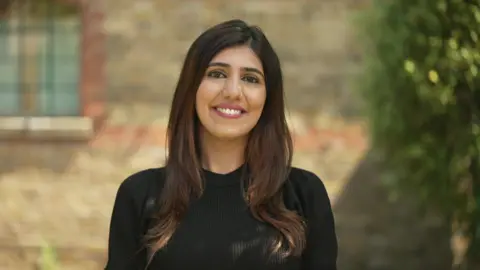 BBC
BBCIt was early 2022, another dark day in London. Lovina Shenoy was new to the city, navigating her way through an unfamiliar and sometimes overwhelming environment.
"Back in India, you have your family, you have your school friends, you have your college friends, you have your entire support system, and you're in your comfort zone," the 39-year-old tells the BBC.
"But when you come to a new country, you're suddenly just left off. You're just all by yourself."
She had spent a decade in Dubai, surrounded by a largely expat-Indian community, and before that, lived in her birth city of Mumbai.
Moving to London for her husband's new job was an exciting opportunity, but despite being in a city of more than 8.9 million people, it still felt isolating.
Lovina was craving female friendships. She was happy to have the company of her husband and two children, but there was something missing.
'I've got my tribe'
"Within a week of moving to London, I realised that the sun starts setting at around 14:00," Lovina jokes. "I thought, I'm going to end up being really lonely and depressed. I have no friends."
So she posted an open message on her Facebook account: "Hey, I'm Lovina, I'm from Mumbai. I was in Dubai for a decade before I moved here. Is anyone free for a cup of coffee?"
To her surprise, dozens of women replied saying they would love to meet her.
She quickly suggested a location in Wembley and was surprised to find more than 30 women turning up.
"I was shocked. I'm in a new country and 30 women I didn't know made the effort to join me for a cup of coffee," she says. "I thought, wow, I've got my tribe."
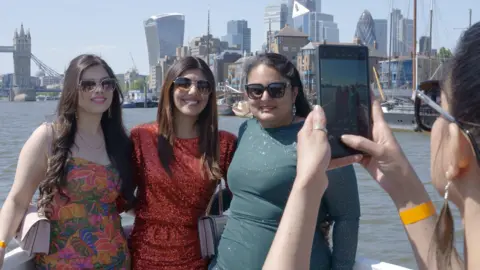
Lovina is part of the largest immigrant group to the UK.
According to the 2021-22 UK Census, an estimated 32% of all foreign-born residents in the UK came from five countries: Poland, Pakistan, Romania, Ireland and India.
Indians made up the highest number of immigrants to the UK with 965,000 people, representing 9% of foreign-born residents.
Following that initial coffee get-together, Lovina started the Indian Women in London & UK (IWLUK) group on Facebook in March 2022.
Shortly after, she started a number of WhatsApp groups according to specific-locations. In just over three years, there are more than 38,000 members on Facebook and 15,000 women across WhatsApp.
Lovina and the group's other three admins, Prableen Rupra, Disha Rawat and Nishi Gill, say that they recognised several challenges faced by migrant women in a new country so worked to tackle it.
They say they established IWLUK to bridge the gap between expats and UK-born Indian women, with the aim of fostering connections through various social and business networking events.
'Confidence to branch out'
The community organises several meetups a month, including walking clubs, brunch, Bollywood-themed parties, mothers meetups and career networking events.
They say that the initiatives have not only deepened their friendships but also facilitated professional development, allowing entrepreneurs to connect.
A member of the group, Anu Chandrasekar, says the community gave her the confidence to start her private career coaching business in 2025, after more than 20 years working in the corporate environment.
"The women definitely gave me the confidence to branch out," she says.
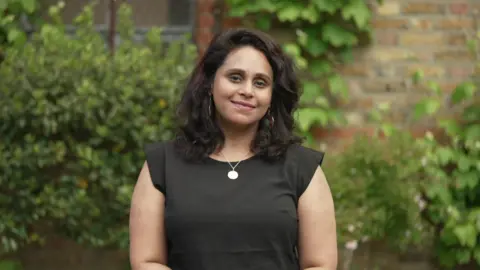
Beyond professional and social development, the community has also offered meaningful support for women facing serious personal challenges.
In one instance, a woman posted anonymously in the Facebook group, revealing that her husband had thrown her out of their home.
Nishi saw the message and quickly made contact with the woman. She arranged support from Indian domestic violence specialists, and organised a safe place for the woman to stay.
"The group was her first port of call," says Nishi. "As an immigrant woman she didn't have the knowledge to approach national charities. But she knew about our group."

Another woman directly benefitting from the knowledge of the community group is Priya Mahajan, from the IWLUK's Mum's Club, who moved to the UK in 2022 with her six-month-old daughter. She found herself unexpectedly overwhelmed when in a UK supermarket.
"I saw so many different types of milk. There was a green one. There was a blue one," Priya says.
"Where I'm from in India we have cow's milk and buffalo milk. There is no differentiation of skimmed, semi-skimmed, high fat, low fat. I was so confused."
So she asked the group and they offered advice.
Priya could have typed her questions into a search engine but she says she felt more comfortable asking other Indian women in a group.
"The group has filled in the roles of people in my life," says Priya. "I found a mother in somebody, a grandmother in somebody, a friend in someone."
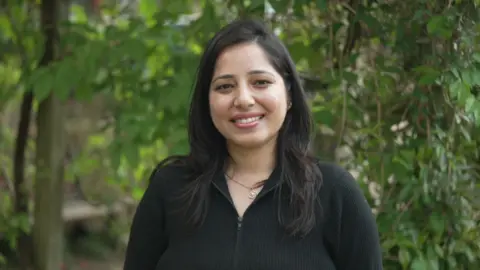
There has been some criticism though, including why the group does not include men.
Lovina took this on board and started a secondary Facebook group called the Indian Professionals in London and UK, which is gender-inclusive. That group has more than 53,000 members.
"I created a group specifically for Indian women, not all women, because I have the specific knowledge about the cultural festivals in the Indian community, like Diwali," says Lovina.
"I am relatable for Indian women. I would know how to run a community for women of similar cultural background to me."
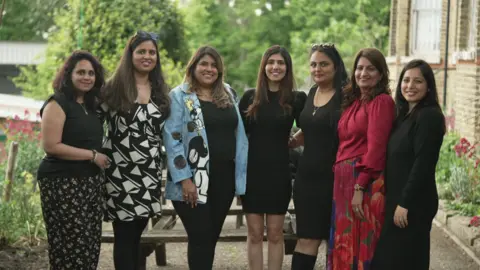
Lovina's group could be part of a solution to tackle the serious impact loneliness has on physical and mental health, an issue that seems to be affecting people around the world after the Covid-19 pandemic halted economic and social activity.
It has been reported that one in five people around the world may experience social isolation.
The World Health Organization has set up a special commission on social connection to gather findings for 2026, and the US Surgeon General has publicly called for loneliness to be treated as a public health priority.
The members of IWLUK say that their community is an example of grassroots support, helping women reconnect when many feel distant from familiar environments.
"We are like the home away from home for the Indian women in the UK," says Lovina. "I think that's the biggest support system for us."
Listen to the best of BBC Radio London on Sounds and follow BBC London on Facebook, X and Instagram. Send your story ideas to [email protected]
